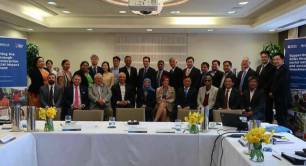Asia-Pacific governments must act now to unlock impact investment, urge GSG and UNESCAP
Inspiration and analysis for policymakers across the Asia-Pacific are provided in research published this month by GSG and UNESCAP. The aim is to boost the role of governments in catalysing impact investment in their countries.
Impact investment should be a foundation of the Covid-19 pandemic recovery in Asia and the Pacific – and governments have a key role to play in making this happen.
This is the belief of the Global Steering Group for Impact Investment (GSG) and the United Nations Economic and Social Commission for Asia and the Pacific (UNESCAP). The two organisations last week published new research that aims to help policymakers stimulate impact investment in their economies as they continue to work towards meeting the UN Sustainable Development Goals (SDGs) in the wake of the pandemic.
Speaking at the launch of the report, Towards an Enabling Policy Environment for Impact Investment in Asia and the Pacific, on 3 December 2020, Jorge Moreira da Silva (pictured below), director of the OECD Development Co-operation Directorate, said: “This report could not come at a more important time.”
He pointed out that the Covid-19 pandemic had made the global funding gap to meet the SDGs even greater.
 “We need urgent action to shift the balance,” he said, pointing out that resources, including impact investment, must be better mobilised to help economies recover from the pandemic and meet the SDGs. “Governments must lead by example,” he said. “There’s no investment if governments don’t do the work.”
“We need urgent action to shift the balance,” he said, pointing out that resources, including impact investment, must be better mobilised to help economies recover from the pandemic and meet the SDGs. “Governments must lead by example,” he said. “There’s no investment if governments don’t do the work.”
Cliff Prior, the CEO of GSG, said: “Covid-19 has underlined the importance of action-driven policies that focus on social and environmental impacts.”
He added: “We have an opportunity to rebuild economies that are more equal and resilient to future shocks, and impact investing should be one of their foundations.”
Jonathan Wong, UNESCAP’s chief of technology and innovation, said the aim of the research was to “turn policymaking around impact investment from an art to a science” by creating a framework around it.
The power of governments to unlock the finance they need
The research points out that even before the Covid-19 pandemic, the Asia-Pacific region required an additional annual investment of $1.5tn to achieve the SDGs by 2030, a figure equivalent to about 5% of their combined GDP.
“It is critical that other stakeholders, particularly the private sector, step in to bridge this investment gap,” says the report.
“If even a fraction of the $51tn in assets managed by the financial sector in the Asia-Pacific region were channelled towards projects that contribute to the SDGs, the 2030 Agenda for Sustainable Development could be achieved. Governments have the ability to unlock this finance by catalysing the impact investment market.”
Inspiration from 18 Asia-Pacific countries
The research examined the impact investment ecosystems in 18 countries in the Asia-Pacific region, including countries with large, advanced impact investment markets, such as India and Singapore, as well as those where impact investment was at an early stage, such as Brunei Darussalam, the Lao People’s Democratic Republic and Myanmar.
According to the research, governments can support the development of impact investment by acting as market facilitators (creating organisations and systems such as centres of expertise and incubators), market participants (providing or sourcing capital) and as market regulators (creating laws).
The researchers highlighted many examples of how governments have supported impact investment in their countries with the aim of inspiring other governments to do the same. These include:
• Republic of Korea: The Social Enterprise Promotion Act 2006 and the Korea Social Enterprise Promotion Agency (KoSEA). The act supports impact investment through a national strategy and KoSEA oversees its implementation. The number of certified social enterprises has grown and the strategy has unlocked impact capital, including a number of government-backed funds.
• Japan: The Act on Utilization of Dormant Deposits 2016. This came into force in 2019 and allows funds from inactive bank accounts to be used to finance social welfare activities through grants, loans and equity.
• Malaysia: Social Impact Exchange. Launched in 2017, this lists high performing social purpose organisations, paralleling a traditional stock exchange. The aim is to channel investment from corporate funders.
• Indonesia: Green bond and Green Sukuk Initiative. These attract local and international private finance for green projects. In January 2019, the government issued its second $750m Green Sukuk which was oversubscribed by 3.8 times.
• Cambodia: Sustainable Finance Initiative. This was set up by the Association of Banks in Cambodia, the National Bank of Cambodia and the Ministry of Environment. It promotes responsible private sector lending by encouraging banks to commit to sustainable finance principles which raise the awareness of the social and environmental impacts of investments.
Mia Mikic, UNESCAP’s director of trade, investment and innovation division (pictured), said: “More than ever, we need to showcase best practices and concrete actions that governments can take to utilise the potential of new investment – investment that can drive the Asia-Pacific’s economic recovery towards social and environment sustainability, boosting the entire impact investment ecosystem towards Sustainable Development Goals.”
Header photo: GSG chair Sir Ronald Cohen at the launch of the Republic of Korea's National Advisory Board on Impact Investing in February 2018




